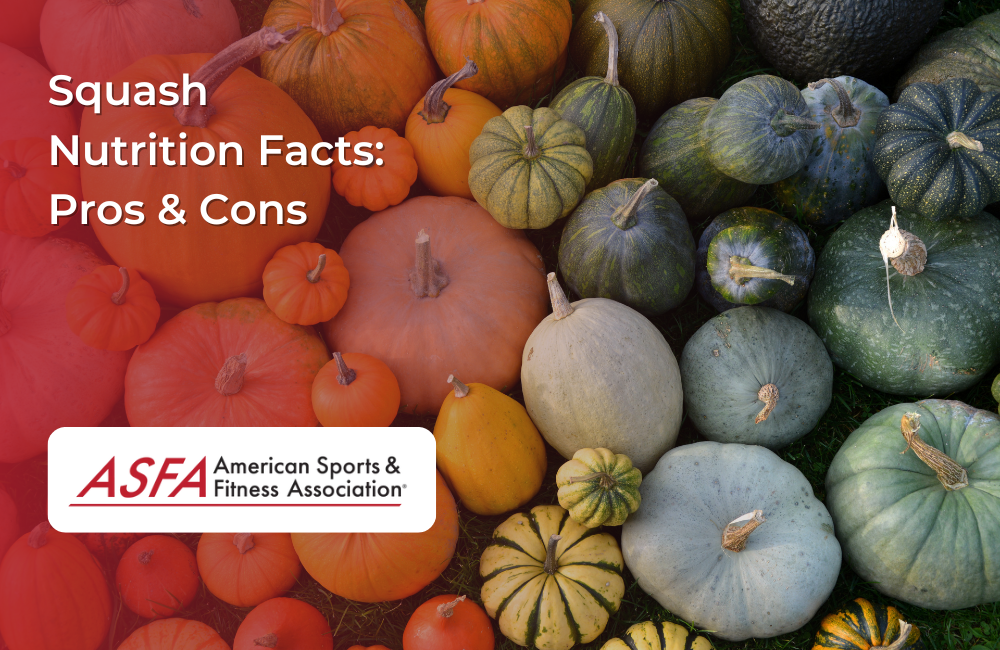Squash is a versatile vegetable that comes in many varieties, including summer squash (like zucchini) and winter squash (like butternut and acorn squash). It is packed with essential vitamins, minerals, and antioxidants while being relatively low in calories. However, some types of squash are higher in carbohydrates, which may be a concern for those on low-carb diets.
Squash Nutrition Facts: Pros and Cons of its Nutritional Profile
One cup (about 205 grams) of cooked squash provides:
-
Calories: Around 80 (varies by type)
-
Carbohydrates: 21 grams (lower in summer squash, higher in winter squash)
-
Dietary fiber: 6 grams
-
Protein: 2 grams
-
Fat: 0.2 grams
-
Sugar: 4 grams
-
Vitamins and Minerals: High in vitamin A, vitamin C, potassium, magnesium, and folate
-
Antioxidants: Rich in carotenoids, including beta-carotene and lutein, which help fight oxidative stress
Pros of Eating Squash
High in Vitamins, Beta Carotene, and Antioxidants
-
Rich in vitamin A, which supports eye health and immune function.
-
Contains vitamin C, which boosts immunity and collagen production.
-
Carotenoids like beta-carotene help reduce inflammation and promote skin health.
-
Antioxidants in squash can play a significant role in reducing oxidative stress, contributing to cancer prevention.
Supports Digestive Health
-
High dietary fiber content promotes regular bowel movements and gut health.
-
Helps prevent constipation and supports a healthy microbiome.
Low in Calories and Supports Weight Management
-
Summer squashes like zucchini are low in calories and carbs, making them ideal for weight loss.
-
Fiber promotes satiety, reducing the likelihood of overeating.
Helps Regulate Blood Sugar
-
Fiber content slows glucose absorption, making squash a good choice for blood sugar control.
-
Winter squash has a higher glycemic index but provides complex carbs for sustained energy.
Supports Heart Health
-
High potassium levels help lower blood pressure.
-
Antioxidants reduce inflammation and protect blood vessels.
Versatile and Easy to Prepare
-
Can be roasted, sautéed with olive oil, steamed, or blended into soups.
-
Works well in sweet and savory dishes.
-
Cubed butternut squash can be used in various recipes, offering rich vitamin content and promoting overall health.
Cons of Eating Squash
Higher in Carbohydrates (Winter Squash)
-
Some varieties like cubed butternut squash and acorn squash contain more natural sugars and carbs than summer squash.
-
Those on low-carb or keto diets may need to limit portions.
Can Cause Digestive Discomfort in Some People
-
High dietary fiber content may cause bloating or gas, especially if eaten in large amounts.
-
People with sensitive digestion or IBS may need to monitor their intake.
May Contain Pesticide Residue
-
Conventionally grown squash may have pesticide residue, especially if eaten with the skin.
-
Washing thoroughly or choosing organic helps reduce exposure.
Possible Allergic Reactions
-
Some individuals may experience mild allergic reactions, especially those sensitive to related plants like melons or cucumbers.
Conclusion
Squash is a nutrient-dense vegetable that provides essential vitamins, antioxidants, and fiber. It supports digestion, heart health, and weight management while offering versatility in meals. While summer squash is low in calories and carbs, winter squash varieties are higher in natural sugars and may require portion control for those watching carb intake. Proper preparation and moderation make squash a great addition to a balanced diet.
FAQs
Is squash good for weight loss?
Yes, summer squash varieties, such as yellow squash, are low in calories and carbs, making them ideal for weight management.
Does squash raise blood sugar?
Winter squash has a higher glycemic index but provides fiber to help regulate blood sugar levels and nutrients like potassium and magnesium that can help lower blood pressure.
Which is healthier: summer squash or winter squash?
Both are nutritious; summer squashes are lower in carbs, while winter squashes provide more vitamin A and complex carbohydrates.
Can I eat squash every day?
Yes, squash can be a healthy daily addition to your diet when consumed in moderation, whether you enjoy summer squash raw or cooked.
Is squash high in fiber?
Yes, squash contains a good amount of dietary fiber, which supports digestion and gut health.
Does squash have protein?
Squash has a small amount of protein but is not a significant source. Pairing it with legumes or protein-rich foods enhances its nutritional value.
Is it safe to eat squash raw?
Yes, some varieties like summer squash raw, such as zucchini, can be eaten raw, while others like butternut squash are best cooked for better digestion.
How can I make squash easier to digest?
Cooking squash softens the fiber, making it easier to digest. Peeling and removing seeds may also help reduce digestive discomfort.





